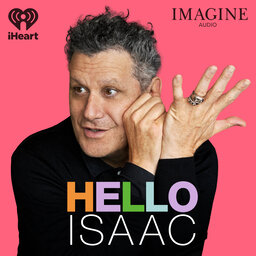Journalist & Podcast Host, Kara Swisher
Isaac Mizrahi chats with the host of the podcasts, “On with Kara Swisher” and “Pivot,” Kara Swisher. They discuss how the internet has changed since she started covering it in 1990, the hope for young people to use technology for good and, of course, “Barbie” and “Three’s Company.”
Follow Hello Isaac on @helloisaacpodcast on Instagram and TikTok, Isaac @imisaacmizrahi on Instagram and TikTok and Kara Swisher @karaswisher.
In 1 playlist(s)
Hello Isaac with Isaac Mizrahi
Isaac Mizrahi is an expert - at almost everything! He’s an iconic fashion designer, actor, singer, …Social links
Follow podcast
Recent clips

Emmy-Winning Actor and Director, Pamela Adlon
51:37

Interior Designer & TV Host, Jeremiah Brent
49:51

Podcast Host & Crooked Media Co-Founder, Jon Lovett
50:53
 Hello Isaac with Isaac Mizrahi
Hello Isaac with Isaac Mizrahi